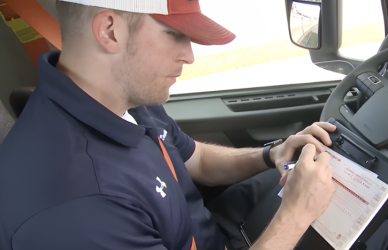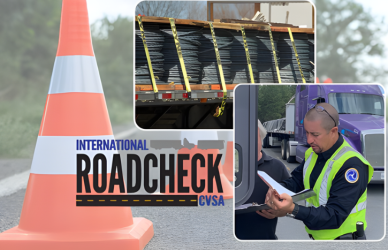A new report by Geotab, a fleet management platform, is ringing the alarm for the transportation industry to take swift action in addressing truck driver stress. The report, titled “The Ripple Effects of Driver Stress on Road Safety and the Bottom Line”, sheds light on an alarming trend with far-reaching consequences, from mental health concerns to rising turnover rates, safety risks, and operational costs.
According to the study, 68% of drivers say work-related stress negatively impacts their job performance, and 78% believe such stress contributes significantly to road hazards.
“This stress leads to increased costs, reduced efficiency, and higher risks for everyone on the road,” remarked Sabina Martin, Vice President of Product Management at Geotab. “The financial impact is significant, including higher insurance premiums, potential legal liabilities, and increased fuel and maintenance costs.”
The Cost of Stress for Transportation Companies
One heavy financial toll caused by driver stress is turnover. Replacing a single driver can cost anywhere between $10,000 and $20,000, according to a 2024 study by the National Academies of Sciences, Engineering, and Medicine. High turnover rates drive up expenses for recruiting and training while leading to lower productivity and increased crash rates.
Factors Contributing to Driver Stress
Drivers experience stress from various sources, including isolation, traffic issues, limited access to healthy food and exercise, dissatisfaction with pay, and unmanageable schedules.
Compensation, in particular, is a primary stressor. The American Transportation Research Institute (ATRI) ranked driver compensation as the fifth-biggest industry challenge in its 2024 list of top issues. Meanwhile, CCJ’s 2024 What Drivers Want survey highlighted pay as a dominant factor contributing to driver stress.
“Stress over money is killing me,” shared Ronald Harvey, a driver for DMR Transportation in Florida. Another respondent emphasized the need for “predictable pay” to ease financial anxiety, while Wisconsin-based driver Josephine Laney noted, “Give the pay they deserve. In doing so it will be less stress and happy work doing what needs to be done.”
Traffic congestion was also cited by truckers in their feedback. “Drivers undergo a lot of stress every day, especially when your primary running area is east of the Mississippi. Bigger towns mean heavier traffic; everyone is in a hurry,” said Tim Hay, a driver for Tyson in Arkansas.
Geotab’s survey reflected similar findings, with 60% of drivers reporting that traffic and road work significantly hinder job completion. The report also outlined growing concerns about speeding, distracted driving, and unsafe practices by other road users. Nearly 26% of drivers admitted to breaking speed limits regularly, while 76% pointed to mobile phone use by other drivers as a major road hazard.
The Toll Stress Takes on Drivers and Road Safety
“When drivers are stressed, they may experience fatigue, reduced concentration, and impaired decision-making abilities—all of which can increase the risk of road accidents,” explained Adam Lang, Director of Customer Advisory Services at Netradyne.
Lang discussed how poor mental health exacerbates stress and correlates with risky behavior on the road. “Drivers who are dealing with mental health challenges may be more prone to engaging in risky behaviors while driving, such as using their phones, eating, or daydreaming, all of which can significantly increase the likelihood of accidents. Addressing mental health concerns and providing support for truckers to manage stress effectively is crucial not only for their well-being but also for the safety of everyone on the road.”
Carrier Strategies to Alleviate Driver Stress
The industry is focusing on fostering better driver wellbeing to improve safety and job satisfaction. Geotab’s study emphasizes that enhancing drivers’ lives not only reduces stress but also attracts and retains a stable workforce while boosting road safety.
Key recommendations from Geotab include:
- Using telematics for in-depth insights into driver behavior
- Deploying driver-focused apps with real-time support
- Implementing advanced driver assistance systems (ADAS) and dash cameras
- Providing virtual reality training opportunities
- Exploring autonomous driving technologies
These strategies aim to build a supportive, tech-driven ecosystem designed to mitigate driver stress while improving operational efficiency and safety.
Trucking Wellness Programs
Several wellness initiatives tailored for truckers have been gaining traction, focusing on health improvement and stress reduction.
- St. Christopher Truckers Relief Fund (SCF) offers programs on smoking cessation, diabetes prevention, and cardiovascular health, alongside financial aid during medical emergencies.
- Rolling Strong delivers a mobile wellness platform featuring personalized health coaching, exercise routines, and nutrition advice, with an app to guide drivers’ wellness journeys.
- The Healthy Fleet Challenge encourages physical activity and better habits through its team-driven format, promoting camaraderie among drivers.
Prioritizing Wellness in 2025 and Beyond
A January survey by Truckstop titled Carrier Insight Survey revealed that wellness is a major priority for 2025. Over 70% of carriers are planning to improve their eating habits and exercise levels in the new year, though balancing work and home life will remain a challenge.
Vik Sridhar, Product Leader at Geotab, underscored the need to enhance driver wellness as a long-term strategy. “The future of the transportation industry depends on a thriving workforce,” Sridhar stated. “Prioritizing driver support is a strategic necessity for carriers to attract and retain drivers, leading to better business outcomes and safer roads.”
Source: Commercial Carrier Journal











